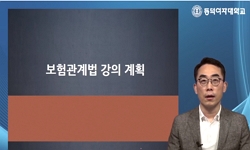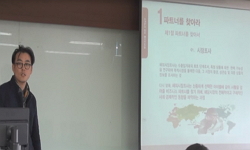In case of insurance for the third party, ‘third party’ does not only mean beneficiary, but also means those who can derive insurant benefit from the insurance contract. Usually, those insurants have the right to claim insurance benefit. However, ...
http://chineseinput.net/에서 pinyin(병음)방식으로 중국어를 변환할 수 있습니다.
변환된 중국어를 복사하여 사용하시면 됩니다.
- 中文 을 입력하시려면 zhongwen을 입력하시고 space를누르시면됩니다.
- 北京 을 입력하시려면 beijing을 입력하시고 space를 누르시면 됩니다.

타인을 위한 보험계약의 의의 및 제3자 해당에 관한 연구 = A Study of an Insurance Contract for Others and Third Party Corresponding
한글로보기https://www.riss.kr/link?id=A107018296
-
저자
황준용 (한국응용통계연구원)
- 발행기관
- 학술지명
- 권호사항
-
발행연도
2020
-
작성언어
Korean
-
주제어
보험계약 ; 피보험이익 ; 타인 ; 낙약자 ; 보험수익자 ; Insurance contract ; Insured benefit ; Third party ; Beneficiary of insurance
-
등재정보
KCI등재
-
자료형태
학술저널
-
수록면
287-315(29쪽)
-
KCI 피인용횟수
0
- DOI식별코드
- 제공처
- 소장기관
-
0
상세조회 -
0
다운로드
부가정보
다국어 초록 (Multilingual Abstract)
The party him/herself is the only person who can derive contractual insurant benefit. Therefore, ‘the third party’ is the only one who is beneficiary of insurance designated by the policyholder in ‘insurance contract for the third party’. According to the commercial law, policyholders can change the beneficiary of insurance since they reserve the rights to designate or change the beneficiary. As such, an insurance beneficiary acquires insurance claim without any particular declaration.
As mentioned above, a person’s life or body can not be measured monetarily with an insurance contract. Therefore, one can become a beneficiary of insurnace even though he or she doesn not have any blood relationship with the policyholder or the insurant. This applies the same way to those who don’t share concerns in any kinds of receivables or debts. An insurnace contract for others (Lebensversicheung für fremde Rechnung) is a type of an insurance which policyholder and insurer signed for others to become the beneficiary of insurance, not themselves. In other words, the subject of the beneficiary of insurance is usually a policyholder’s close aqquaintence or consanguinity such as their paprents, spouse, and children.
For example, a mother signs an insurance contract for her son to become the beneficiary of insurance. If the insruant accidently passes away due to an insured accident, the insurance contract for the third party then promotes economic stability of the dependent of the contract. It is for the purpose to protect the benefit of the ones who have special ties or relationship with the policyholder.
There are two types of ‘insurance for the third party’. The first is ‘one’s own insurance for the third party’, which policyholder and insurant are the same person, but the beneficiaries of insurance are not. The other is ‘insurance for the third party’, which insurant and the beneficiary of insurance are not the same person as the policyholder. In the second case, there are also two different types. One is the situation where policyholder and insurant are two different persons, but the insurant and the beneficiary of insurance are the same person. In the other case, the policyholder, the insurant, and the beneficiary of insurance are all different persons. However, commercial law doesn’t regualte whether or not to accept such insurance which the policyholder is not separately designated as a type of ‘insurance for the third party’. Since it is rational to sign an insurance contract for onself, not for the others, it is appropriate to understand that the policyholder signed a contract of ‘insurance for oneself’, not ‘insurance for the third party’ in this case.
In case of insurance for the third party, ‘third party’ does not only mean beneficiary, but also means those who can derive insurant benefit from the insurance contract. Usually, those insurants have the right to claim insurance benefit. However, the insurant benefit hasn’t been generally acknowledged in precedents in accordance with insurance contract.
The party him/herself is the only person who can derive contractual insurant benefit. Therefore, ‘the third party’ is the only one who is beneficiary of insurance designated by the policyholder in ‘insurance contract for the third party’. According to the commercial law, policyholders can change the beneficiary of insurance since they reserve the rights to designate or change the beneficiary. As such, an insurance beneficiary acquires insurance claim without any particular declaration.
As mentioned above, a person’s life or body can not be measured monetarily with an insurance contract. Therefore, one can become a beneficiary of insurnace even though he or she doesn not have any blood relationship with the policyholder or the insurant. This applies the same way to those who don’t share concerns in any kinds of receivables or debts. An insurnace contract for others (Lebensversicheung für fremde Rechnung) is a type of an insurance which policyholder and insurer signed for others to become the beneficiary of insurance, not themselves. In other words, the subject of the beneficiary of insurance is usually a policyholder’s close aqquaintence or consanguinity such as their paprents, spouse, and children.
For example, a mother signs an insurance contract for her son to become the beneficiary of insurance. If the insruant accidently passes away due to an insured accident, the insurance contract for the third party then promotes economic stability of the dependent of the contract. It is for the purpose to protect the benefit of the ones who have special ties or relationship with the policyholder.
There are two types of ‘insurance for the third party’. The first is ‘one’s own insurance for the third party’, which policyholder and insurant are the same person, but the beneficiaries of insurance are not. The other is ‘insurance for the third party’, which insurant and the beneficiary of insurance are not the same person as the policyholder. In the second case, there are also two different types. One is the situation where policyholder and insurant are two different persons, but the insurant and the beneficiary of insurance are the same person. In the other case, the policyholder, the insurant, and the beneficiary of insurance are all different persons. However, commercial law doesn’t regualte whether or not to accept such insurance which the policyholder is not separately designated as a type of ‘insurance for the third party’. Since it is rational to sign an insurance contract for onself, not for the others, it is appropriate to understand that the policyholder signed a contract of ‘insurance for oneself’, not ‘insurance for the third party’ in this case.
국문 초록 (Abstract)
민법상 제3자를 위한 계약의 보상관계에 있어 낙약자가 제3자에 대하여 직접적인 급부의무를 부담함에 따라 제3자가 낙약자에 대하여 직접적인 청구권을 갖도록 하는 약정부분은 엄격하면서 복잡하다. 타인을 위한 보험계약상 대가관계에 있어서 특별히 살펴보아야 할 점, 보험계약자가 무상으로 보험수익자를 지정한 경우 해당 대가관계를 사인처분, 생전처분 여부 등이다. 타인을 위한 보험계약의 대가관계를 보험계약자가 보험료지급이라는 출연을 통해 발생하는 보험금청구권을 무상으로 보험수익자에게 제공하는 경제적 실질관계 등을 고려한 법적 검토를 살펴보고자 한다.
타인을 위한 보험계약은 근본적으로 보험금을 수취할 권리가 있는 자를 의미하는 것이 아닌 보험계약상의 피보험이익을 취할 수 있는 멸실 또는 감가를 의미한다. 타인을 위한 보험계약에...
타인을 위한 보험계약은 근본적으로 보험금을 수취할 권리가 있는 자를 의미하는 것이 아닌 보험계약상의 피보험이익을 취할 수 있는 멸실 또는 감가를 의미한다. 타인을 위한 보험계약에서 ‘타인’이란 보험계약자가 지정하는 보험수익자를 의미한다. 상법 상 보험계약자는 보험수익자 변경권을 유보함으로써 보험수익자를 언제든지 변경할 수 있고, 이에 따라 보험수익자는 별다른 수익의 의사표시 없이도 보험금청구권을 취득한다. 그러나 현대사회에서 거래관계가 복잡·다양화됨에 따라 계약체결의 편의를 위하여 타인을 위한 보험계약은 現 보험형태로 자리매김해왔다. 타인을 위한 보험계약의 보험수익자는 보험계약관계자 등과 별다른 이해관계가 없는 제3자가 될 수도 있지만 대게 보험계약관계자와 혈연관계나 특별한 이해관계를 가진 자가 보험수익자가 된다.
민법상 제3자를 위한 계약의 보상관계에 있어 낙약자가 제3자에 대하여 직접적인 급부의무를 부담함에 따라 제3자가 낙약자에 대하여 직접적인 청구권을 갖도록 하는 약정부분은 엄격하면서 복잡하다. 타인을 위한 보험계약상 대가관계에 있어서 특별히 살펴보아야 할 점, 보험계약자가 무상으로 보험수익자를 지정한 경우 해당 대가관계를 사인처분, 생전처분 여부 등이다. 타인을 위한 보험계약의 대가관계를 보험계약자가 보험료지급이라는 출연을 통해 발생하는 보험금청구권을 무상으로 보험수익자에게 제공하는 경제적 실질관계 등을 고려한 법적 검토를 살펴보고자 한다.
참고문헌 (Reference)
1 남궁술, "프랑스 개정 민법에서의 전자계약에 관한 고찰" 법학연구소 34 (34): 229-263, 2017
2 홍진희, "타인을 위한 생명보험계약의 수익자 지정과 변경 - 유언에 의한 방법을 중심으로 -" 대한변호사협회 (420) : 58-78, 2011
3 이상수, "타인을 위한 생명보험계약의 개념에 관한 고찰" 건국대학교 2 (2): 1991
4 김교창, "타인을 위한 보험계약" 고시계사 31 (31): 1986
5 송덕수, "채권법각론" 박영사 2017
6 곽윤직, "채권각론[민법강의Ⅳ]" 박영사 2007
7 정동윤, "주석상법[보험(Ⅰ)]" 한국사법행정학회 2015
8 송영민, "제3자를 위한 계약의 발전과 일본민법의 대응" 한국재산법학회 30 (30): 311-332, 2013
9 장재현, "제3자를 위한 계약(민법 제539조, 제541조)에 대한 개정론" 법학연구원 (45) : 425-446, 2014
10 최영봉, "전자서명의 효력에 관한 연구" 국제무역학회 9 (9): 2003
1 남궁술, "프랑스 개정 민법에서의 전자계약에 관한 고찰" 법학연구소 34 (34): 229-263, 2017
2 홍진희, "타인을 위한 생명보험계약의 수익자 지정과 변경 - 유언에 의한 방법을 중심으로 -" 대한변호사협회 (420) : 58-78, 2011
3 이상수, "타인을 위한 생명보험계약의 개념에 관한 고찰" 건국대학교 2 (2): 1991
4 김교창, "타인을 위한 보험계약" 고시계사 31 (31): 1986
5 송덕수, "채권법각론" 박영사 2017
6 곽윤직, "채권각론[민법강의Ⅳ]" 박영사 2007
7 정동윤, "주석상법[보험(Ⅰ)]" 한국사법행정학회 2015
8 송영민, "제3자를 위한 계약의 발전과 일본민법의 대응" 한국재산법학회 30 (30): 311-332, 2013
9 장재현, "제3자를 위한 계약(민법 제539조, 제541조)에 대한 개정론" 법학연구원 (45) : 425-446, 2014
10 최영봉, "전자서명의 효력에 관한 연구" 국제무역학회 9 (9): 2003
11 "서울중앙지방법원 2010. 5. 4. 선고 2009나35919 판결"
12 최병규, "생명보험의 보험수익자 지정 법리에 대한 고찰" 한국보험법학회 7 (7): 2013
13 최기원, "상법학신론(하)" 박영사 2008
14 정희철, "상법학(하)" 박영사 1990
15 채이식, "상법강의(하)-어음·수표·보험·해상법-" 박영사 2003
16 정찬형, "상법강의(하)" 박영사 2017
17 정동윤, "상법(하)" 법문사 2011
18 박세민, "보험법" 박영사 2019
19 이기수, "보험·해상법" 박영사 2015
20 최준선, "보험·해상·항공운송법" 삼영사 2016
21 곽윤직, "민법주해[Ⅻ] - 채권(5)" 박영사 2009
22 "대법원 2020. 2. 27. 선고 2019다204869 판결"
23 "대법원 2018. 9. 13. 선고 2016다255125 판결"
24 "대법원 2015. 9. 10. 선고 2015두41401 판결"
25 "대법원 2012. 3. 29. 선고 2009다45320 판결"
26 "대법원 2010. 8. 19. 선고 2010다3180, 31877 판결"
27 "대법원 1999. 6. 11. 선고 99다489 판결"
28 "대법원 1974. 12. 10. 선고 73다1591 판결"
29 "대법원 1973. 2. 28.선고 72다1858 판결"
30 民法(債權法)改正檢討委員会, "詳解債權法改正の基本方針Ⅴ (各種の契約(2)" 商事法務 2010
31 高島浩一, "米国連邦電子署名法と保険業界の評価" ニッセイ基礎研究所 2000
32 大森忠夫, "生命保険契約法の諸問題" 有斐閣 1958
33 山下友信, "現代の生命·傷害保険法" 弘文堂 2000
34 藤田友敬, "最高裁判所民事判例研究- 生命保険の保険金受取人の変更の方法-" 東京大学判例研究会 107 (107): 1990
35 "日本最判昭和58年(1983) 9月8日昭和56年(オ)第1196号·「民集」 第37巻第7号"
36 "日本最判昭和15年(1940) 12月13日昭和14年(オ)第168号·「民集」第19巻"
37 洲崎博史, "保険金受取人の指定・変更" 商事法務硏究会 (1330) : 1993
38 山下友信, "保険法" 有斐閣 2005
39 古澤幸司, "保険契約者及び保険受取人の地位と保険金受取人指定・変更の対抗要件" 日本共済協会 2014
40 Brian T. Casey, "Where's The E-Sign? A Primer On Electronic Signature Laws"
41 Julius von Staudingers, "Kommentar zum Bürgerlichen Gesetzbuch mit Einführungsgesetz und Nebengesetzen. Buch 2, Recht der Schuldverhältnisse, Neubearb.(입법 및 관련 기본 법에 따른 민법에 따른 논평)"
42 Sommer Jared, "Electronic Signatures and the UETA: E-Commerce in an Insecure E-World" 37 (37): 2001
43 Robert A. Wittie, "Electronic Recrods and Signatures under the Federal E-SIGN Legislation and the UETA" 56 (56): 2000
44 서헌제, "(사례중심체계) 상법강의(하) - 보험법·해상법·어음수표법)" 법문사 2002
동일학술지(권/호) 다른 논문
-
- 동국대학교 비교법문화연구소
- 류지웅
- 2020
- KCI등재
-
- 동국대학교 비교법문화연구소
- 조진우
- 2020
- KCI등재
-
- 동국대학교 비교법문화연구소
- 조성민
- 2020
- KCI등재
-
- 동국대학교 비교법문화연구소
- 심민석
- 2020
- KCI등재




 eArticle
eArticle








